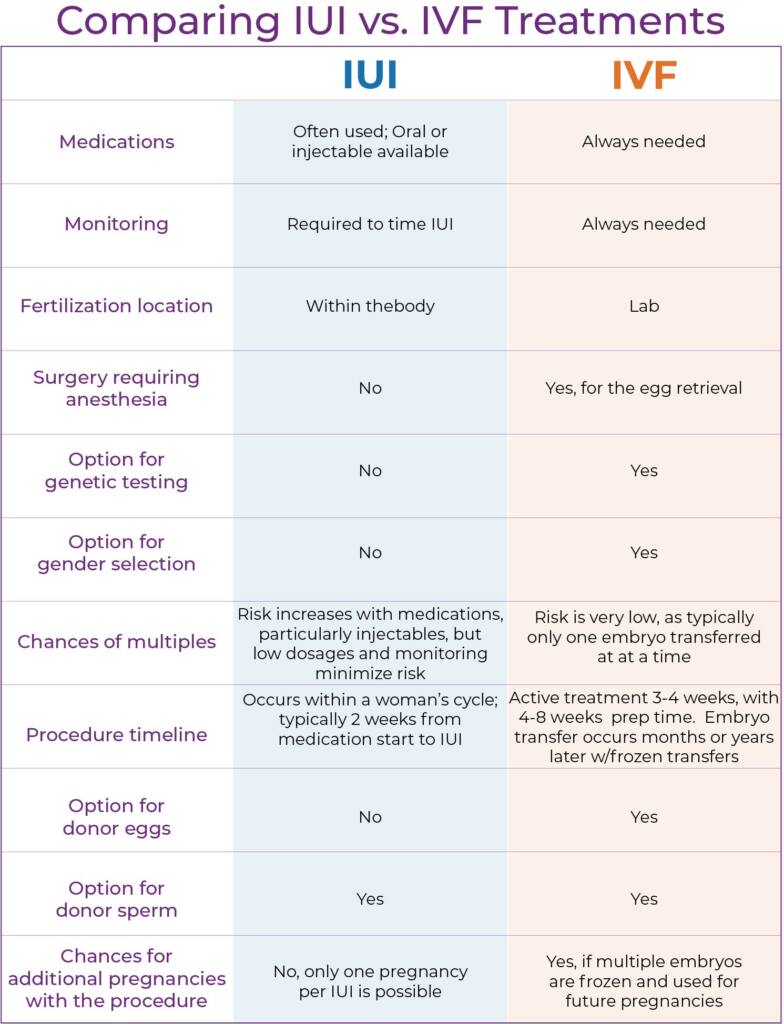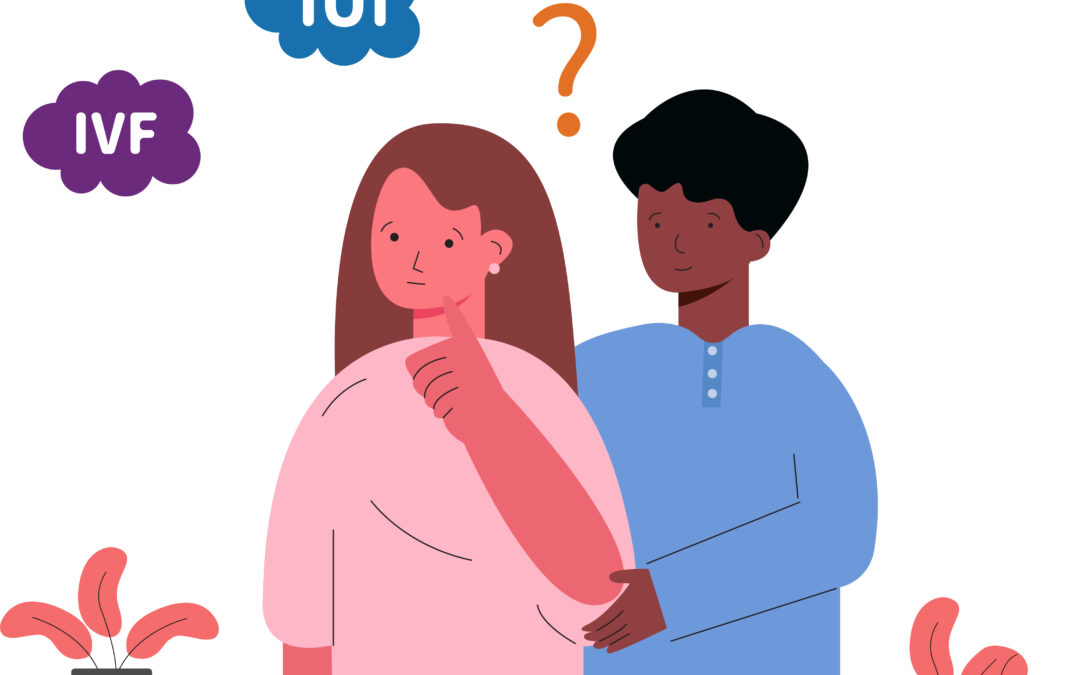Key Points:
- IUI (Intrauterine insemination) is a fertility treatment in which fertilization of the egg takes place inside the fallopian tube within the body
- IVF (In vitro fertilization) is a treatment in which the sperm and egg are combined for fertilization in a lab.
- IVF has a higher success rate than IUI
- A fertility specialist will look at individual variables to determine if IUI or IVF has a good chance of success.
Read all about IUI, IVF, the differences them, success rates, cost, and more below……
Getting pregnant is not always as easy as a couple or individual hopes. Sometimes it takes the assistance of a fertility specialist and medical intervention to achieve a pregnancy.
Among heterosexual women in the U.S. aged 15 to 49 with no prior births, about 1 in 5 women (19%) are unable to conceive after one year of trying.
Intrauterine insemination (IUI) and in vitro fertilization (IVF) are two treatments available to couples seeking to address infertility. These treatments are also options for a patient trying to achieve pregnancy using donor sperm.
What is IUI?
IUI, also known as intrauterine insemination, is a relatively simple procedure. A fertility specialist places sperm, which has been collected and processed in a lab, directly into the uterus. Before sperm is placed, it is “washed” and purified in the lab to separate the sperm from the seminal fluid. This washing treatment significantly increases the concentration of sperm placed in the uterus compared to the volume that typically enters the uterus during intercourse.
When sperm is injected directly into the uterus, the distance it has to travel to an egg is considerably less than when it enters the uterus through the cervix during intercourse. This reduction in travel distance gives the sperm a better chance of successfully reaching an egg.
IUI is Scheduled Around Ovulation
Each month, an egg grows within the ovary in what is called a follicle. During the middle of the cycle (around days 12-16), the egg is ready to be released from the ovary, called ovulation.
The IUI procedure is timed to occur when the egg is being released. Most women will better help time the ovulation and IUI by using an ovulation medication, also called a ‘trigger shot’.
The placement of sperm into a uterus usually only takes 5-10 minutes to complete. First, the fertility specialist will use a speculum to locate the cervix. Then a very thin, flexible tube is inserted through the cervix into the uterus. The sperm sample is injected through the tube at the top of the uterus. This is a painless process and there is no anesthesia required. The sperm then swim to the egg in the fallopian tube, and if fertilization occurs, a pregnancy test is positive two weeks later.
IUI is often combined with ‘ovulation induction’, where medication is used to help grow eggs to increase the likelihood of conception.
What is IVF?
In vitro fertilization (IVF) is another form of assisted reproductive technology (ART) in which sperm and eggs are combined in the IVF lab. Treatment with IVF includes fertility medication to stimulate egg growth. Ovaries typically produce just one follicle and egg each month. However, using injectable hormones causes the ovaries to produce multiple follicles and eggs in a cycle. The amount of eggs that can be produced varies between individuals.
Once the eggs mature, a fertility specialist retrieves the eggs through the vagina during a 10-20 minute outpatient surgical procedure called oocyte retrieval. This procedure is performed under sedation. The eggs are then sent to a lab to be combined with the partner or donor sperm via conventional insemination or ICSI (intracytoplasmic sperm injection) on that same day. Eggs that successfully fertilize will produce embryos. The embryo(s) then develop for several days, after which they are either transferred into the uterus or saved frozen for a future transfer. The embryo is also able to be tested to determine the number of chromosomes the embryo contains or if the embryo carries certain pre-identified inherited conditions.
What’s the Difference Between IUI and IVF?
There are several key differences between IUI and IVF. With IUI, fertilization of the egg takes place inside the fallopian tube within the body. With IVF, the sperm and egg are combined for fertilization in the IVF lab. In addition, the embryo created with IUI cannot be tested, while an embryo created via IVF can undergo genetic testing prior to use for pregnancy.
Another key difference between IUI and IVF is that for most patients, IVF has a higher per-cycle success rate. While IUI can be less expensive and less invasive than IVF, the cost of multiple IUIs, if unsuccessful, may be similar to pursuing IVF. For those attempting IUI, fertility specialists typically recommend three rounds of IUI before choosing to progress to IVF.

IUI vs IVF Treatment Process
For either IUI or IVF to be successful, an egg must first be fertilized and then successfully implant in the lining of the uterus. Finally, the embryo must have the appropriate genetics to remain implanted and continue to develop.
IUI and IVF have a few things in common. Most have to do with preparation for treatment and implantation of the embryo in the uterus.
Before fertilization, both IUI and IVF treatments involve fertility drugs to increase the production of eggs combined with procedures to allow for sperm to be closer to the eggs by isolating the highest quality sperm from the provided sperm samples.
IUI vs IVF Cost
Individuals often try IUI before IVF because of its significantly lower cost. IUI typically costs $3,500-$5,000 per cycle, depending on the fertility clinic’s location and protocols, insurance coverage, the type of medications used, labs, and follow up needed.
But because IUI can be considerably less effective than IVF, couples may require multiple cycles before conception is achieved. This can bring the overall expense closer to the cost of IVF.
The average cost of IVF in the United States is around $12,000- $18,000+. This range reflects a number of variables that come into play such as:
- insurance coverage
- freezing embryos vs a fresh embryo transfer
- opting for additional treatments such as ICSI or PGT-A
IUI vs IVF Success Rates
Fertility clinics across the U.S. report data on the assisted reproductive technology (ART) cycles started and completed in their clinics. ART includes all fertility treatments in which eggs or embryos are handled.
Based on the data from the Centers for Disease Control (CDC) from clinics in 2019:
- Among women less than 35 years of age using IVF with their own eggs, 47% achieved the birth of a single baby.
- For women 35-37 years, the success rate was 34%.
- For women ages 38-40 years, the success rate was 22%.
- For women over 40 years using their own eggs, 7.5% of IVF cycles resulted in the live birth of a single baby.
Success rates for the first IVF cycle are even higher than the percentages above, which include not only first cycles but also subsequent cycles. Women under 35 doing their first IVF cycle had a 57% success rate while women over 40 had a 9.2% success rate on their first IVF cycle.
So, while the odds of IVF success vary greatly depending on age, sperm and egg quality, reasons for infertility, and clinic, it is fair to say that ideal candidates currently have percentage odds in the range of 50-60%.
Success rates for IUI, on the other hand, can range considerably, but averages 15-20% for ideal candidates. This lower percentage compared to IVF is why many individuals choose to proceed to IVF.
Based on individual factors, a person’s odds for conception may be much higher or much lower than the averages. Working closely with a fertility specialist will help an individual have a better sense of their personal odds for birth success.
IUI or IVF: Which is Right for You?
There are many factors that go into determining if IUI or IVF is right for you. IUI is often an individual’s first choice because it is less invasive and less expensive per treatment cycle. Patients who are good candidates for IUI have viable eggs, functional and open fallopian tubes, and the availability of good quality sperm for insemination.
If these variables are not in place, then IVF is often considered a more viable option. Due to the process, IVF is helpful for many types of infertility, including disorders of the fallopian tubes, endometriosis, low sperm count or motility, advancing age, or unexplained infertility. IVF is also necessary for those using donor eggs or a gestational carrier (surrogate).
If you have questions about IUI or IVF, or need help identifying if you need fertility assistance, a fertility clinic can help. The mission of Atlantic Reproductive Medicine Specialists in Raleigh, NC is to provide the highest level of personalized fertility care. If you have questions, contact us or schedule a preconception counseling appointment with one of our experts.

